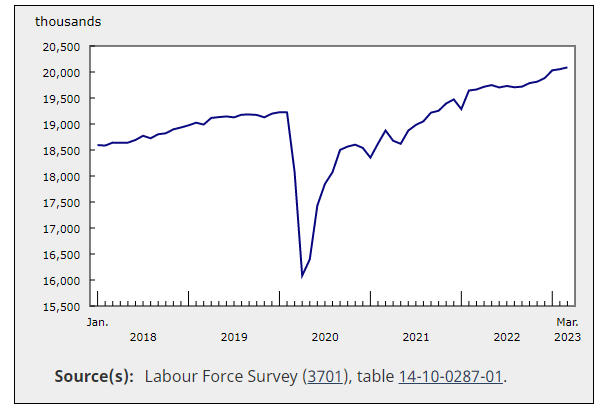Jobs growth in Canada powers along for seventh straight month

ssuni
Employment in Canada increased by 34.7K in March, more than double the 12.0K consensus, higher than the 21.8K increase in February, and representing the seventh straight month of job gains. Meanwhile, average hourly wages growth remained elevated, rising 5.3% Y/Y vs. +5.4% in the previous month.
The unemployment rate stayed at 5.0%, slightly lower than the 5.1% expected.
The strongest employment gains came in transportation and warehousing (+41K); business, building and other support services (+31K); and finance, insurance, real estate, rental and leasing (+19K). Sectors that saw declines are construction (-19K); "other services" (-11K), which includes personal and repair services; and natural resources (-11K).
Canada's labor participation rate ticked up to 65.6% from 65.7% in February, and exceeded the 65.5% consensus.
Canada Employment Increases in March
Statistics Canada said there were fewer women aged 55 to 64 working (-13K), partly offsetting gains in the previous month. Overall, employment was unchanged among women and rose among men.
In March, the Bank of Canada's Governing Council kept its policy rate at 4.5%, but said it's prepared to raise the rate further if needed to return inflation to the 2% target. The stronger-than-expected jobs report may make it more difficult for the central bank to keep its rate unchanged.
The Canadian dollar has slipped 0.1% against the U.S. dollar in Thursday trading. The iShares MSCI Canada ETF (NYSEARCA:EWC) slipped 0.2%.
The Bank of Canada paused rate increases in March, after hiking rates at a record pace over the previous 11 months. The bank makes its next rate decision on Wednesday, April 12.
